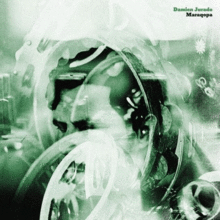
Damien Jurado
Maraqopa
(Secretly Canadian; 2012)
By Dom Sinacola | 30 April 2012
Though Maraqopa represents the next permutation of Damien Jurado’s partnership with producer Richard Swift (who, since helming the dewy-soft rock of 2010’s Saint Bartlett, seems ever-closer to signing on for a full-time gig with Jurado), his eleventh album in as many years is, like every album poised behind Jurado’s swarthy name, an incremental shift toward something Jurado always obviously had in him anyway. I’m thinking mostly—and fondly—of 2003’s Where Shall You Take Me?, which is yet unsurpassed as the burly songwriter’s masterpiece. Choked with grainy malaise, nostalgic to the point of utter stagnation, but breathing an economy of empirical melody, the record’s pure in the same way the cover of Nebraska (1982) is bleak. Or in the same way its own cover is bleak. Which is to say: there has been no clearer venue for Jurado’s simple, almost ineffable power than that of his 2003 paean to the darkhearted dustbowl of smack-dab, middle-of-forever America.
It’s why Maraqopa—and Barlett before it, and Caught in the Trees (2008) and And Now That I’m in Your Shadow (2006) and On My Way to Absence (2005) before them—is both a vast improvement over his past couple as well as surprisingly staid given the broader palette Jurado’s exploring with Swift at his side. Because Jurado’s wandering slowly toward existential drama, toward big, blank metaphysical spots, and Where Shall You Take Me? was such a magnificent achievement of place—though he may’ve dragged a lover from “Texas to Ohio,” may’ve found a way out, if only briefly, via the “Matinee,” may’ve paced the ruins of “Omaha” to declare, hopelessly, “This country will know us by name,” Jurado’s pinned to that sepia cover art, is still waiting outside “Abilene”’s window, still waiting around to get over You.
Maraqopa, though it refers to concrete locales like Nevada or Washington (the bewitching “Working Title” feels somehow like the most blisteringly honest thing Jurado’s made in a decade, a doo-woppy shuffle belying the longing and nostalgia at its core), is most saliently a headspace, and a headspace adorned with religious idols, psychedelic reveries, and third eye noodling at that. For a storyteller as convincing as Jurado—with a finely tuned ear, mind you, which only supports his status as perhaps the Pacific Northwest’s most valuable bard now that Elliott Smith’s gone—contextlessness feels almost like a cheat. Plus those songs aren’t really about Nevada or Washington so much, though the line “What’s it like for you in Washington? / I’ve only seen photos of Washington, I’ll never know” is so perfectly placed it speaks of every long-distance relationship I’ve ever had, every misplaced affection I’ve ever misplaced, every place I’ve never had the guts to visit or every bit of curiosity I’ve similarly, cowardly never entertained. (“You’re no him but he’s you only better,” not to mention, is worth 2,000 more words I can’t bear at the moment, speaking as directly as it does to every artist’s attempt to devote oneself to an altered reality, an act which, at its core, is futile and inevitably heartbreaking.)
So Maraqopa flirts with some styles past Jurado’s bread-and-butter, introducing a gut-churning hallucination of a guitar solo, say (opener “Nothing is the News”), or a kid-like choir following Jurado’s feckless lead, pulled straight from Ryan Gosling’s tour diary (“Life Away from the Garden”), or a triumphant organ drone rising heedlessly toward a transcendence Jurado’s never really made possible before (“Everyone a Star”). It’s a grand gesture, this expansiveness—if anything Jurado releases can be called grand, his somnambulant pace never far from the purview that defines everything he does—but all the electric bleating and adolescence does little to distract from the kernel of consistency Jurado’s been milking for almost nine years. Really, for as long as he’s been on Secretly Canadian. Maraqopa should come as no surprise, after all—that it’s sometimes brilliant, that it’s sometimes treacly, that it’s windburnt and browned and inviting, that it’s no Where Shall You Take Me? but Where Shall You Take Me? is it only better. It’s a moving forward, but it’s not an ascension. It’s just wonderfully consistent, satisfyingly familiar, and for a guy whose best is states and years and realities far behind in the graying mist, that he still finds mists ahead to puncture and liaisons yet to dwell within is a testament to the grace with which Jurado plods onward.





